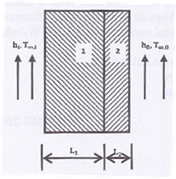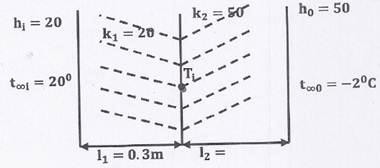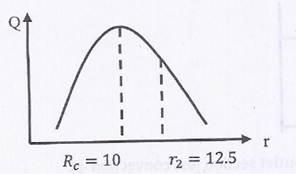Solved GATE Questions on Conduction
Question 1. Consider steady-state heat conduction across the thickness in a plane composite wall (as shown in the figure) exposed to convection conditions on both sides.

Given : ![]()
![]() ;
; ![]() ;
; ![]() ;
; ![]() ;
; ![]() ;
; ![]() .
.
Assuming negligible contact resistance between the wall surfaces, the interface temperature , in T( ), of the two walls will be
), of the two walls will be
(A) 
(B) 
(C) 
(D) 
GATE-ME-2009
Hint 1. (Ans C)
![]()
![]()
![]()
Now


![]()


Alternately
Under steady state conditions



![]()
![]()
![]()
![]()
Question 2. A fin has 5 mm diameter and 100 mm length. The thermal conductivity of fin material is 400  . One end of the fin is maintained at 130
. One end of the fin is maintained at 130 and its remaining surface is exposed toambient air at 30
and its remaining surface is exposed toambient air at 30 . If the convective heat transfer coefficient is 40 W/
. If the convective heat transfer coefficient is 40 W/ , the heat loss (in W) from the fin is
, the heat loss (in W) from the fin is
(A) 0.08
(B) 5.0
(C) 7.0
(D) 7.8
GATE-ME-2010
Hint 2. (Ans B)
Question 3. A pipe of 25 mm diameter carries steam. The heat transfer coefficient between the cylinder and surrounding is 5 W/ . It is proposed to reduce the heat loss from the pipe by adding insulation having a thermal conductivity of 0.05 W/mK. Which one of the following statements are True?
. It is proposed to reduce the heat loss from the pipe by adding insulation having a thermal conductivity of 0.05 W/mK. Which one of the following statements are True?
(A) The outer radius of the pipe is equal to the critical radius.
(B) The outer radius of the pipe is less than the critical radius.
C) Adding the insulation will reduce the heat loss.
(D) Adding the insulation will increase the heat loss.
GATE-ME-2011
Hint 3. (Ans C)
![]()
![]()
![]()
![]()
![]()

![]() addition of insulation will reduce heat loss.
addition of insulation will reduce heat loss.

Question 4. Consider one-dimensional steady state heat conduction, without heat generation, in a plane wall; with boundary conditions as shown in the figure below. The conductivity of the wall is given by  where
where  and b are positive constants, and T is temperature.
and b are positive constants, and T is temperature.

will
(A) Remain constant
(B) Be zero
(C) Increase
(D) Decrease
GATE-ME-2013
Hint 4. (Ans D)
![]()
![]()
As x increases, T increases from  decreases.
decreases.
Question 5. Consider one-dimensional steady state heat conduction along x-axis( ), through a plane wall with the boundary surface (x=0 and x=L) maintained at temperatures of 0
), through a plane wall with the boundary surface (x=0 and x=L) maintained at temperatures of 0 and 100
and 100 . Heat is generated uniformly throughout the wall. Choose the correct statement.
. Heat is generated uniformly throughout the wall. Choose the correct statement.
(A) The direction of heat transfer will be from the surface at 100 to the surface at 0
to the surface at 0 .
.
(B) The maximum temperature inside the wall must be greater than 10 .
.
(C) The temperature distribution is linear with in the wall.
(D) The temperature distribution is symmetric about the mid-plane of the wall.
GATE-ME-2013
Hint 5. (Ans B)
![]()
General profile is

Question 6. A steel ball of diameter 60 mm is initially in thermal equilibrium at 1030 in a furnace. It is suddenly removed from the furnace and cooled in ambient air at 30
in a furnace. It is suddenly removed from the furnace and cooled in ambient air at 30 , with convective heat transfer coefficient h=20
, with convective heat transfer coefficient h=20 . The thermo-physical properties of steel are ; density
. The thermo-physical properties of steel are ; density  , conductivity k=40W/mK and specific heat c=600 J/kgK. The time required in seconds to cool the steel ball in air from 1030
, conductivity k=40W/mK and specific heat c=600 J/kgK. The time required in seconds to cool the steel ball in air from 1030  to 430
to 430  is
is
(A) 519
(B) 931
(C) 1195
(D) 2144
GATE-ME-2013
Hint 6. (Ans D)
Lumped analysis
![]()
![]()
![]()
![]()
Apply log,
![]()

Common data for Question 7 and 8
Water (Specific heat,![]() ) enters a pipe at a rate of 0.01 kg/s and a temperature of 20
) enters a pipe at a rate of 0.01 kg/s and a temperature of 20![]() . The pipe , of diameter 50 mm and length 3m, is subjected to a wall heat flux
. The pipe , of diameter 50 mm and length 3m, is subjected to a wall heat flux ![]() in
in ![]() .
.
GATE-ME-2013
Question 7. If  and the convection heat transfer coefficient at the pipe outlet is 1000
and the convection heat transfer coefficient at the pipe outlet is 1000 , the temperature in
, the temperature in  at the inner surface of the pipe at the outlet is
at the inner surface of the pipe at the outlet is
(A) 71
(B) 76
(C) 79
(D) 81
Hint 7 (Ans D)

Convection does not matter as we take outlet section just convection in
![]()
![]()
![]()
![]()
![]()
Where ![]() wall temperature at the outlet
wall temperature at the outlet


Where h=heat transfer coefficient at the pipe outlet=76+5=81
Question 8. If  , where
, where  is in meter and in the direction of flow (
is in meter and in the direction of flow ( at the inlet), the bulk mean temperature of the water leaving the pipe in
at the inlet), the bulk mean temperature of the water leaving the pipe in  is
is
(A) 42
(B) 62
(C) 74
(D) 104
Hint 8. (Ans B)
![]()
![]()
![]()

![]()
Answer Keys
1. (C) 2. (B) 3. (C) 4. (D) 5. (B) 6. (D) 7. (D) 8. (B)